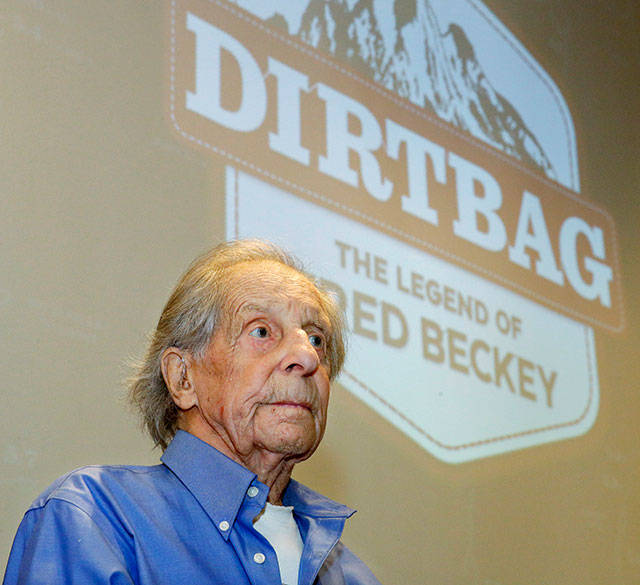Even as an octogenarian, Fred Beckey tried to climb mountains along routes nobody had mastered.
We’re not speaking metaphorically here: Beckey — one of America’s most proficient climbers and a fixture in the Pacific Northwest mountaineering scene — continued to lug his gear up precipitous inclines when he was in his late eighties. We learn this in the documentary “Dirtbag: The Legend of Fred Beckey,” a lively portrait of a crank.
Late in the film, as Beckey painfully ascends another hillside and a successful ascent looks increasingly unlikely, a friend tries to philosophize. “The main thing is that you get up high,” the friend says, “it doesn’t matter how you get there.” Beckey immediately says, “Yeah, it does.”
How you interpret Beckey’s response will determine how you feel about him: Either his pursuit of new climbing routes is a measure of his integrity, or it’s a symptom of his off-putting monomania. We can make up our own minds about that, because the film, directed by Dave O’Leske, is appreciative without being worshipful.
Beckey was born in Germany in 1923, and his parents moved to Seattle two years later; he died in the city on Oct. 30, 2017, age 94. Fred and younger brother Helmy became climbing enthusiasts as adolescents, astonishing the mountaineering world by making the second-ever ascent of British Columbia’s Mount Waddington, a forbidding 13,186-foot monster.
Fred was 19, and Helmy turned 17 during a brutal night at the summit. This was no small feat: Thirty-five years would pass before anybody else topped the mountain.
It launched Fred Beckey’s reputation, but his brother scampered off to pursue a music career in Europe — and because Helmy was no longer useful as a climbing partner, Fred fell out of contact with him.
If, like me, you consider getting out of bed in the morning a successful ascent, it may be puzzling that the form of self-punishment called the “first ascent” (being the first human to reach the top of a mountain, or finding a new way there) is considered important. Beckey notched a heap of first ascents, establishing his reputation as one of the country’s leading alpinists.
Nevertheless, he was not invited to join the Apollo program of mountaineering: The 1963 expedition that put Seattleite Jim Whittaker as the first American atop Mount Everest. The film gives a good account of the snub.
Expedition participants allude to Beckey’s shortcomings as a team player, specifically an incident during a mid-1950s international expedition to climb Lhotse, near Everest, when Beckey left his climbing partner in a tent overnight — a breach of protocol that was not forgotten. (Beckey returned to the camp the next morning and retrieved the man, who survived.)
The film is made with the customary collection of archive clips, folkie music and talking heads. The latter include Whittaker, journalist Timothy Egan and Yvon Chouinard, a onetime Beckey climbing partner who went on to found Patagonia (the outdoor gear company is also a “presenter” of the film).
Beckey’s career as a womanizer is described, another form of conquest for which he apparently kept meticulous notes. As for the film’s title, Beckey resists the term “dirtbag,” but he embodies the model of a guy living out of his car, focused only on the goal, unperturbed by how much time passes between encounters with soap.
Even people who acknowledge that Beckey could be a difficult character — that’s almost everybody, actually — agree he should’ve gotten more credit for his achievements. “Dirtbag” goes a long way to confirm his legacy.
It also paints a compelling picture of mania and its contradictions. Beckey’s obsession made him a pioneer, but what was it about, beyond putting a check mark next to the names on a list of peaks? Based on the character we meet on screen, the idea that it was never enough to “just get up high and enjoy it” seems not only off-putting but sad.
“Dirtbag: The Legend of Fred Beckey” (3 stars)
Documentary portrait of the cranky Seattle climber who was one of North America’s most accomplished mountaineers. The film is appreciative without being worshipful, so you can make up your own mind about whether Fred Beckey was a legend or an off-putting monomaniac.
Rated: Not rated; probably R for language
Opening Friday: SIFF Film Center
Talk to us
> Give us your news tips.
> Send us a letter to the editor.
> More Herald contact information.

























